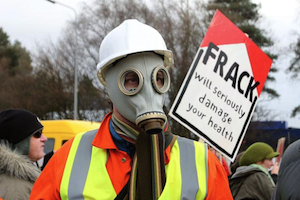
For years, studies have shown a correlation between natural gas fracking extraction and health impacts, especially respiratory problems. Now three new studies from Pennsylvania — the heart of fracking country — make the case even more strongly that fracking is dangerous to human health.
Epidemiologists at the University of Pittsburgh, which was contracted to do the research, found evidence that minors living close to fracking sites are over five times more likely to develop a rare type of childhood cancer. They also found a greatly increased risk of asthma attacks among people of all ages, and lowered birth weights.
Between The Lines’ Melinda Tuhus spoke with Dr. Ned Ketyer, a retired pediatrician and board president of the Pennsylvania chapter of Physicians for Social Responsibility. Here he talks about the three studies, the impacts on Pennsylvania residents, especially children, and what needs to happen next. Activists have been very disappointed thus far with Pennsylvania Gov. Josh Shapiro’s lack of response to this serious health crisis.
DR. NED KETYER: The University of Pittsburgh embarked on three separate studies looking at the impact of fracking on health here in Pennsylvania. One looked at asthma, one looked at birth outcomes and the third one looked at rare childhood cancers that seemed to be on the increase in southwest Pennsylvania.
For the asthma studies, they looked at more than 46,000 patients diagnosed with asthma from the University of Pittsburgh Medical Centers data. What they found was to me a bombshell. They found that people who have asthma who live close to fracked gas wells had a much bigger – four to five times – risk of having an asthma attack. Their risk of hospitalization, their risk of emergency room visits, their risk of having severe asthma attacks, was higher.
And it seems that the biggest risk came when the wells were in the production phase — in other words, after the preparation phase, which lasts for weeks. The drilling and fracking phase which can last from weeks to months; the production phase can last for years or even decades. And the risk was found up to 10 miles from a fracked gas well. That’s a long distance to have an impact on air quality and health in residents who live nearby.
You know, asthma is not a mild disease. It can be a quite serious disease, even life-threatening for some people. In Pennsylvania, there was a study that came out in 2019 by two reporters at the Pittsburgh Post-Gazette. They found that there was a spike of rare childhood cancers in southwestern Pennsylvania between 2008 and 2018. They found 27 cases of a very rare bone cancer called Ewing’s sarcoma. That’s a brutal and often deadly cancer — 40 episodes of other rare childhood cancers, for a total of 67 rare cancers in children, teenagers and young adults.
The second study on childhood cancers was really eye-opening and it found that for people who lived within one mile of a gas well, those children had a much higher risk – 5 to 7 times the risk compared to someone who lived farther away – of developing lymphoma, which is a rare cancer but a very serious cancer and that was also a bombshell.
The third study involved looking at the Pennsylvania Department of Health Birth Registry, and they evaluated 185,000 births in Pennsylvania, and what they found was that infants who were born to pregnant women who lived near wells during the production phase, they were 20 to 40 grams smaller at birth. In other words, their birth weight was affected, but also they were born small for gestational age. There was also an association with prematurity due to air pollution. This is consistent with other findings that show birth outcomes are worse the closer mothers are to fracked gas wells and other studies have also shown abnormal birth outcomes related to prematurity, low birth weight and small gestational age newborns.
MELINDA TUHUS: Dr. Ned Ketyer, I know these studies weren’t the first to show the health impacts of fracking, but with even more evidence, what do you think can happen to address this grave problem?
DR. NED KETYER: You know, the ball is now in Gov. Shapiro’s lap and in the lap of the Pennsylvania legislature to do something. It’s past time for health-protective policies when it comes to fracking. And there are already many things that can be done.
When Gov. Shapiro was attorney general, he convened a grand jury in 2020, and that grand jury came up with eight recommendations – specific ideas to protect the public against this industry. It’s important for the governor and the legislature to come to agreement to increase setback distances. Right now in Pennsylvania, the allowed distance between a home or a business and a fracking well is 500 feet and that’s way too close. It needs to be much bigger than that.
Other things that can be done include aggregate emissions. It’s important for researchers as well as policymakers at the Department of Environmental Protection who grant permits to keep those aggregate emissions in mind instead of just looking at one site at a time.
For more information, visit the Pennsylvania Chapter of Physicians for Social Responsibility at psrpa.
For the best listening experience and to never miss an episode, subscribe to Between The Lines on your favorite podcast app or platform:
Apple Podcasts, Spotify, Stitcher, Google Podcasts, Amazon Music, Tunein + Alexa, Castbox, Overcast, Podfriend, iHeartRadio, Castro, Pocket Casts, RSS Feed.
Or subscribe to our Between The Lines and Counterpoint Weekly Summary.




